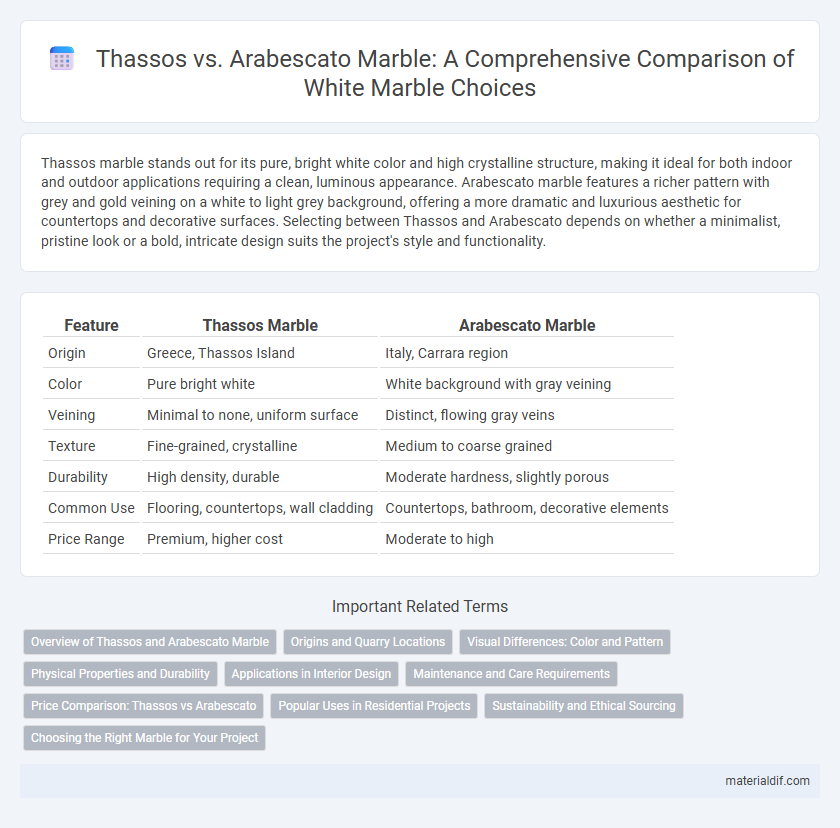Thassos marble stands out for its pure, bright white color and high crystalline structure, making it ideal for both indoor and outdoor applications requiring a clean, luminous appearance. Arabescato marble features a richer pattern with grey and gold veining on a white to light grey background, offering a more dramatic and luxurious aesthetic for countertops and decorative surfaces. Selecting between Thassos and Arabescato depends on whether a minimalist, pristine look or a bold, intricate design suits the project's style and functionality.
Table of Comparison
| Feature | Thassos Marble | Arabescato Marble |
|---|---|---|
| Origin | Greece, Thassos Island | Italy, Carrara region |
| Color | Pure bright white | White background with gray veining |
| Veining | Minimal to none, uniform surface | Distinct, flowing gray veins |
| Texture | Fine-grained, crystalline | Medium to coarse grained |
| Durability | High density, durable | Moderate hardness, slightly porous |
| Common Use | Flooring, countertops, wall cladding | Countertops, bathroom, decorative elements |
| Price Range | Premium, higher cost | Moderate to high |
Overview of Thassos and Arabescato Marble
Thassos marble, quarried from Greece, is renowned for its pure, bright white color and remarkable translucency, making it a popular choice for luxury interiors and sculptures. Arabescato marble, primarily sourced from Italy, features a white background adorned with intricate gray veining that adds a dynamic, elegant character to countertops and flooring. Both types offer high durability and a polished finish, but Thassos is favored for its uniformity and brightness, while Arabescato is prized for its dramatic veining patterns.
Origins and Quarry Locations
Thassos marble originates from the island of Thassos in Greece, renowned for its pure white color and fine grain. Arabescato marble is quarried primarily in the Apuan Alps of northern Italy, distinguished by its white base with intricate grey veining. The unique geological formations of these regions create distinct aesthetics and qualities in each marble type.
Visual Differences: Color and Pattern
Thassos marble is characterized by its pure, bright white color and consistent, fine-grained texture, creating a sleek and minimalist aesthetic. Arabescato marble features a white base with distinctive, dramatic gray veining patterns that form elegant swirls and arabesques, adding a dynamic and luxurious visual effect. The contrast between Thassos's uniform whiteness and Arabescato's bold, intricate veining defines their unique decorative appeal in architectural and design applications.
Physical Properties and Durability
Thassos marble is renowned for its pure white color and fine crystalline structure, offering exceptional brightness and a smooth, uniform texture ideal for elegant interiors. Arabescato marble features distinctive gray veining on a white background with a slightly coarser grain, providing a dramatic and luxurious aesthetic. In terms of durability, Thassos marble is denser and more resistant to scratching and weathering, making it suitable for both indoor and outdoor applications, while Arabescato requires more care due to its susceptibility to etching and staining.
Applications in Interior Design
Thassos marble, renowned for its pure white color and high reflectivity, is ideal for brightening interior spaces such as bathrooms, kitchens, and living rooms, often used for flooring, wall cladding, and countertops. Arabescato marble features elegant gray veining on a white background, making it a preferred choice for statement pieces like feature walls, fireplace surrounds, and luxurious countertops in upscale residential and commercial interiors. Both marbles enhance aesthetic appeal and durability but cater to different design moods--Thassos for sleek minimalism and Arabescato for classical sophistication.
Maintenance and Care Requirements
Thassos marble requires minimal maintenance due to its dense, non-porous nature, making it highly resistant to stains and scratches. Arabescato marble, with its more porous surface and intricate veining, demands regular sealing and gentle cleaning to prevent etching and discoloration. Both types benefit from pH-neutral cleaners, but Thassos generally offers greater durability with less upkeep.
Price Comparison: Thassos vs Arabescato
Thassos marble is generally more expensive due to its pure white color and limited availability, while Arabescato marble offers a more affordable option with its distinctive veining and gray-white background. Pricing for Thassos can range from $50 to $150 per square foot, compared to Arabescato, which typically costs between $40 and $100 per square foot. The cost difference is influenced by extraction difficulty, rarity, and demand in luxury interior markets.
Popular Uses in Residential Projects
Thassos marble is highly sought after in residential projects for its pure white color and exceptional brightness, making it ideal for luxurious flooring, bathrooms, and kitchen countertops. Arabescato marble, with its elegant grey veining on a white background, is popular for accent walls, fireplace surrounds, and bespoke furniture surfaces. Both marbles enhance residential interiors but Thassos is preferred for a minimalist, luminous aesthetic, while Arabescato adds a dramatic, sophisticated touch.
Sustainability and Ethical Sourcing
Thassos marble is renowned for its exceptional purity and bright white color, often sourced from quarries with strict sustainability protocols to minimize environmental impact. Arabescato marble, characterized by its elegant grey veining, is typically extracted using advanced ethical sourcing practices that ensure worker safety and reduce carbon emissions. Both marbles exemplify the industry's shift towards eco-friendly production, but Thassos maintains a stronger reputation for sustainable quarry management and reduced ecological footprint.
Choosing the Right Marble for Your Project
Thassos marble, known for its pure white color and high reflectivity, is ideal for projects requiring a clean, bright aesthetic with strong durability and resistance to weathering. Arabescato marble features distinctive gray veining on a white background, offering a more ornate and classical look suited for interiors and decorative applications where elegance and detailed patterns are desired. Selecting between Thassos and Arabescato depends on whether the project prioritizes minimalistic brightness and toughness or aesthetic complexity and softer textures.
Thassos vs Arabescato Infographic

 materialdif.com
materialdif.com